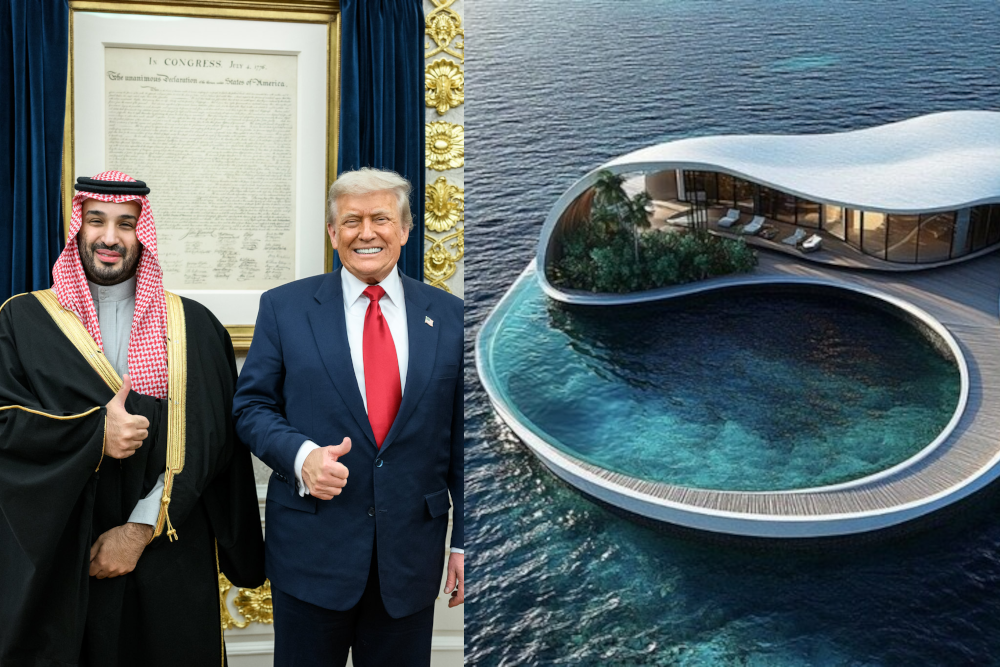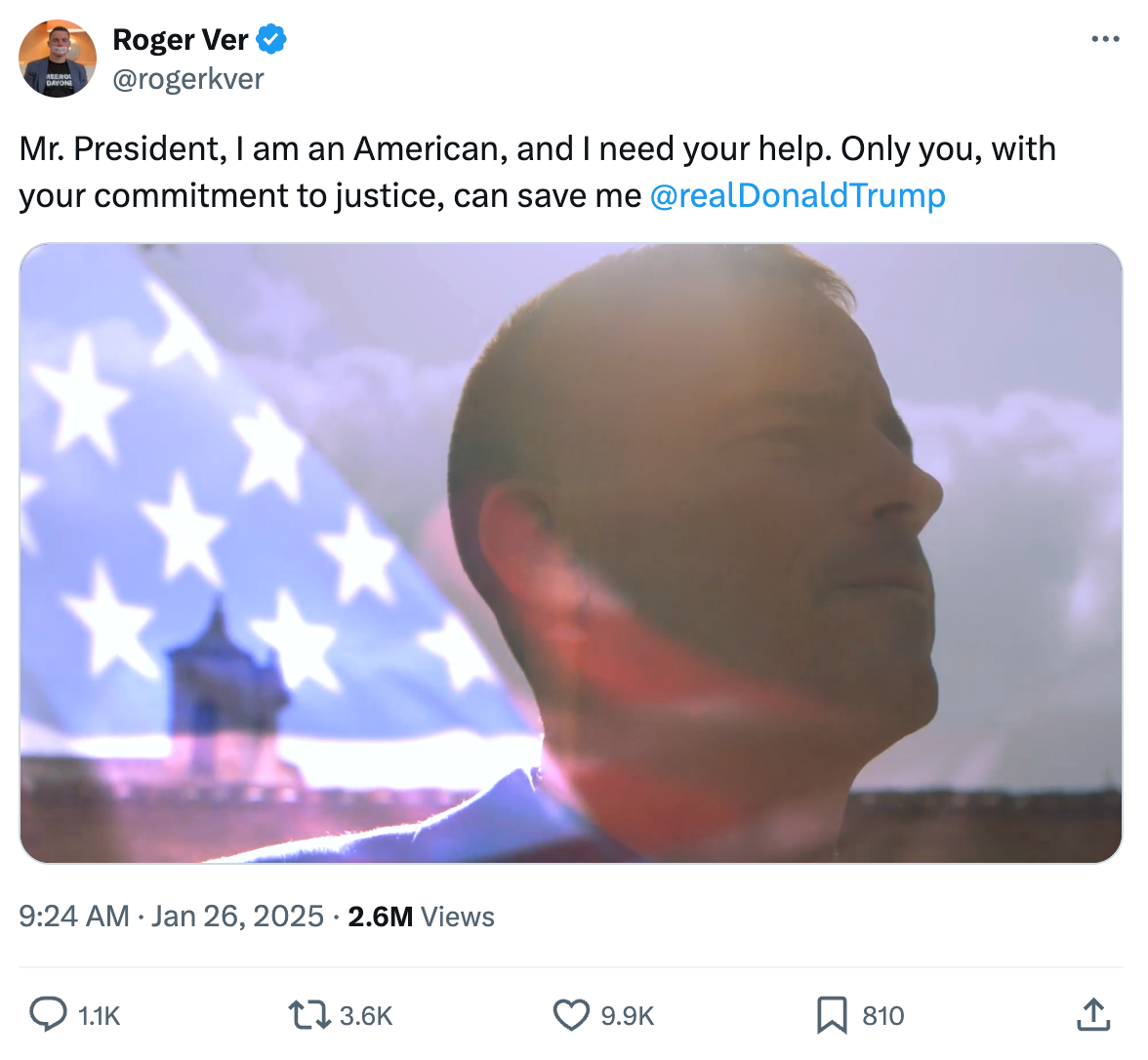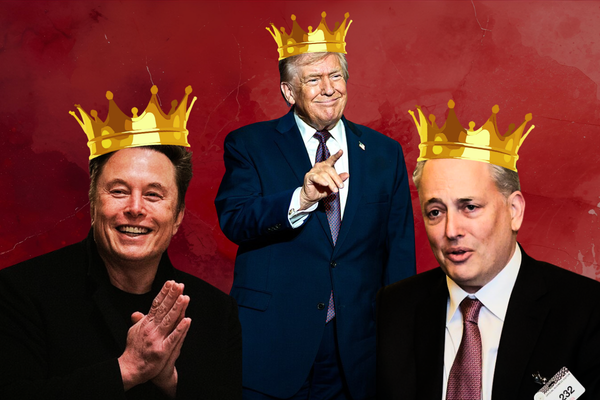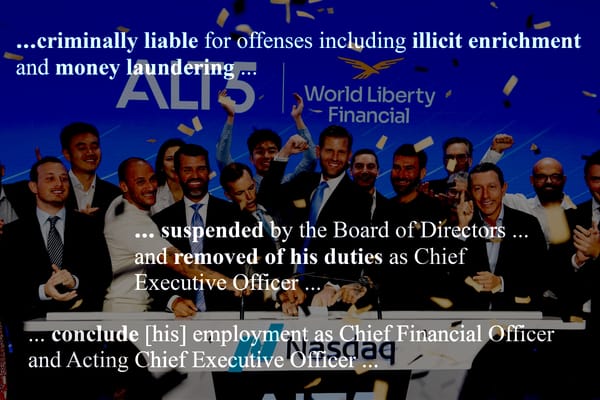Issue 97 – This is hardship
While slumping prices have some fearing it’s crypto winter again, Trump looks to Saudia Arabia and American retail crypto investors to fund the development of his next hotel


Bitcoin has fallen back below $100,000, wiping out much of the “Trump pump” gains over the past year. After a two-month slide, some fear this is the beginning of another bust in a market defined by its often catastrophic boom-and-bust cycles. With heavy leverage across crypto trading and misconduct that often stays hidden until falling prices apply pressure, collapses can be swift and brutal — as 2021–2022 illustrated — and some traders worry we’re due for a repeat.
On November 3, the major defi protocol Balancer suffered a $110 million exploit, which also affected some protocols that reused Balancer code. Then, a $93 million collapse of the Stream Finance yield platform the following day led to $285 million (that we know of so far) in contagion across the crypto ecosystem, including to projects like Elixir’s deUSD algorithmic stablecoin.1 The aftershocks of these defi failures, combined with faltering crypto prices and extremely jittery macroeconomic conditions, are already leading to wider fallout.
On November 17, the tracking platform DappRadar announced it will shut down after seven years, calling the business “financially unsustainable in the current environment.”2 The rout has dragged down stock prices across crypto firms like Circle, Coinbase, and Gemini.a Shares of digital asset treasury companies — a big trend earlier this year, in which publicly traded firms with core businesses unrelated to crypto pivoted to amassing large crypto treasuries — have been sliding for even longer. MicroStrategy (now just “Strategy”) is down 50% since the summer. Nakamoto, the bitcoin treasury vehicle led by Trump ally David Bailey, has cratered more than 95% since its August merger with the healthcare company KindlyMD.
It’s too soon to tell whether this slide is just the beginning of another crypto apocalypse, or if it’s just routine crypto volatility. Either way, I’ll be here to chronicle it — except for my scheduled hiatus beginning November 26. If history is any guide, that’s exactly when the market will choose chaos.
Citation Needed is an independent publication, entirely supported by readers like you. Consider signing up for a free or pay-what-you-want subscription — it really helps me to keep doing this work.
Trump business interests
Newest on President Trump’s rapidly expanding list of crypto ventures is a Trump-branded hotel and resort in the Maldives, which the Trump Organization says will be financed by “tokenizing” the project’s construction phase on a blockchain and selling the tokens to US retail investors.34 The Trump sons and some of their crypto business partners have lately been eagerly pitching the idea of new projects involving both real estate and blockchains [I94], which they present as an opportunity for retail investors who they claim have been unfairly excluded from high-risk real estate investments — rather than what it plainly is: an opportunity for Trump to start bilking everyday people as well as institutional lenders, contractors, and laborers.
The project is being developed with the Saudi company Dar Global, continuing the now-familiar pattern of lucrative Trump administration and family deals with Persian Gulf governments and companies. Congressional and public outcry over apparent corruption and ethics violations involving a $2 billion UAE investment in Binance denominated in the Trump family’s stablecoin (which would route tens of millions in interest on the reserves to the Trumps) [I83], a White House–brokered AI-chips deal with the UAE [I93], and another White House deal granting the UAE a 15% stake in TikTok [I94] evidently have not slowed Trump’s pursuit of similar arrangements.
Details of the tokenization scheme are scarce. The Trump Organization has not said whether buyers will receive any share of resort revenues, or indeed any benefits at all. But its statement that the project “tokenizes the development phase itself, offering investors the opportunity to participate in a high-growth, premium real estate project from inception” reads like a textbook securities offering under any pre‑Trump SEC. After all, the Howey test — the test to determine if an instrument qualifies as an investment contract under federal securities laws — involved a 1946 case in which a Florida company developed their orange farming operation by selling real-estate contracts to investors without agricultural knowledge or experience, with a promise that the company would farm the groves and generate profits on investors’ behalf.

The Trump Organization’s announcement came the same day that President Trump announced the US would sell F-35 fighter jets to Saudi Arabia, after the country’s leadership appealed to him personally. The move angered Israel, given the potential to shift the region’s military balance, and it stoked fears among US military intelligence officials that the Saudis would share the technology with China. The sales will still need to be approved by Congress.5
The following day, Trump hosted Saudi Crown Prince Mohammed bin Salman at the White House. This was the prince’s first visit to the United States since the 2018 assassination of Washington Post journalist Jamal Khashoggi, a frequent critic of the Saudi government and advocate for press freedom. The US CIA and Office of the Director of National Intelligence found that Mohammed had ordered Khashoggi’s killing, and Trump himself said at the time that “if anyone were going to be [involved with the plot to kill Khashoggi], it would be [Mohammed]”.6
Now, Trump’s stance on that — much like his stance on crypto — has taken an abrupt 180. When ABC News reporter Mary Bruce asked Mohammed about Khashoggi’s assassination, Trump quickly interrupted: “He knew nothing about it. You don’t have to embarrass our guest by asking something like that.” Referring to Khashoggi, Trump said, “A lot of people didn’t like that gentleman that you’re talking about, whether you like him or didn’t like him, things happen.” When the same reporter later asked another question — this time about why Trump is waiting for Congress to vote to release the Epstein files, rather than doing it himself — Trump attacked her as “a terrible reporter” and said he thinks the FCC should revoke ABC’s broadcasting license.7
In Congress
Senate Banking Committee Chair Tim Scott (R-SC) has said he thinks that he can move market structure legislation out of the Senate Agriculture and Banking committees by the end of the year. Both committees are working on their own drafts, and Scott seems optimistic that the drafts can go through markup, committee voting, and a merger process to produce a single bill for consideration by the full Senate in early 2026. That said, Scott’s various deadlines for the crypto market structure bill have repeatedly come and gone, so I don’t put much stock in this one. Earlier this year, Scott was confident that a market structure bill would be finished by the end of September [I91]. He’s blamed all delays on Democrats, telling Fox News that “The Democrats have been stalling and stalling and stalling because they don’t want President Trump to make America the crypto capital of the world.”8
Senators Warren (D-MA) and Reed (D-RI) have sent yet another letter about Trump’s crypto entanglements. The latest, addressed to Treasury Secretary Scott Bessent and Attorney General Pam Bondi, inquires about whether and how they are investigating “national security risks posed by the U.S. crypto platform, World Liberty Financial, Inc. (WLF), in light of recent reports that it sold tokens to buyers that conducted business with North Korean state-sponsored hackers, sanctioned Russian money-laundering entities, and other illicit actors.”9 They cite a recent report by watchdog group Accountable.US outlining sales of WLFI tokens to a user who made substantial deposits with the Iranian Nobitex exchange, a user who has been using the Russian ruble-backed A7A5 stablecoin, and alleged fraudster Andrei Grachev [I90]. Both Nobitex and A7A5 have been heavily linked to sanctions evasion, and the creators of the A7A5 token have themselves been sanctioned by the US.10 The report also alleges that World Liberty sold WLFI tokens to a user who transacted with the North Korea–sponsored and US-sanctioned Lazarus cybercrime group; however, this was apparently a false positive after Accountable.US’s researchers mistook transactions with a joke project spoofing a Lazarus wallet for transactions with the genuine cybercrime group. Uniswap and OpenSea had also previously blocked the user’s wallet, suggesting Accountable.US may not have been the only group to misidentify the transactions. 11
In the courts
MEV bot brothers
The prosecution of the two brothers who exploited MEV bots on Ethereum [I58, 95] has ended in a mistrial. Jurors were subjected to a month-long, intensely technical crash course on Ethereum, maximal extractable value,b and the hordes of bots that execute automated trades on the network. Over three days of deliberations, jurors submitted eleven notes to the judge indicating that they were struggling to reach a verdict. In the final one, sent on the evening of Friday November 7, jurors wrote, “We held another vote. We are no closer to a unanimous decision. We are under stress. Yesterday some cried. Many have not slept. This is hardship.” The judge declared a mistrial, seeing no hope that the jury would reach a verdict the following Monday, and facing the risky possibility of having to proceed with only eleven jurors due to a scheduling conflict.c As crypto advocate Neeraj Agrawal wrote, “A group of every day Americans was forced to learn how Ethereum works and this was the result.”12 He’s right — sometimes that abyss stares back.
I originally wondered if the mistrial might give the prosecutors an easy excuse to drop the case. In addition to being highly technical and challenging to explain to a jury, there are genuine questions around whether the brothers were defrauding bot operators who in turn were making automated trades that often disadvantage humans they’re trading against or if they were simply out-trading those bots in a largely lawless ecosystem where it’s expected there will be winners and losers. But the original charges were brought in 2024, by a Biden-era Justice Department from which Trump’s DOJ has been eager to distance itself — particularly when it comes to crypto-related cases. An April 2025 memo from Deputy Attorney General Todd Blanche condemned the Biden-era DOJ’s approach to crypto, deeming it a “reckless strategy of regulation by prosecution, which was ill conceived and poorly executed”. In the memo, he outlined new DOJ priorities aligned with Trump’s directive to support the crypto industry, dismantled the National Cryptocurrency Enforcement Team, and directed the Criminal Division’s Market Integrity and Major Frauds Unit to halt cryptocurrency enforcement [I81].
Despite its professed shift, the Trump-era DOJ has been erratic on crypto enforcement. In statements and in select cases — especially those involving wealthy, well-connected players — it has appeared lenient. It dropped an investigation into crypto prediction market platform Polymarket [I89]. It’s looking to settle a major tax evasion case against Roger Ver, a wealthy crypto investor who in January published a video plea to Trump for leniency, complete with waving flags, a dramatized enactment of Ver being arrested, and Ver insisting “I am an American, and I will die an American” (Ver renounced his US citizenship in 2014 in hopes of avoiding taxes on his crypto gains, though he now says it was to escape “lawfare” from the US government) [I57, 91, 95]. The department has also said it won’t prosecute developers who write crypto software “without ill-intent” even if they fail to register as money transmitters.13 And Trump himself rebuked the Biden-era DOJ by pardoning Binance founder Changpeng Zhao, framing relief for a man alleged to have deliberately evaded US regulations to profit from American customers as a stand against a “war on crypto”.

But simultaneously, the Justice Department has continued to aggressively prosecute Roman Storm, a developer of the Tornado Cash cryptocurrency mixing software who received a mixed verdict in his August trial [I90]. The agency recently pursued the maximum sentence against the developers of Samourai Wallet, another crypto mixing service [I96]. And now, rather than dropping the charges, prosecutors have asked for a new trial date to take another swing at convicting the MEV brothers, who face up to 20 years in prison if convicted.
Tornado Cash
The prosecution of Tornado Cash developer Roman Storm has been controversial among crypto enthusiasts and privacy advocates [Tornado, Tornado 2]. Initiated under Biden, the Trump DOJ nevertheless took the case to trial, infuriating those who hoped Trump’s crypto pivot would protect those in the space without as much influence — not just his deep-pocketed benefactors. Prosecutors eked out a conviction on one charge while the jury deadlocked on the two more serious charges [I90].
Weeks later, Assistant Attorney General Matthew Galeotti told a crypto conference that “merely writing code, without ill-intent, is not a crime,” which some took as a signal the DOJ might retreat from the unpopular case. Instead, the agency filed a sprawling brief opposing Storm’s motion for acquittal [I94], urging the judge to uphold the one conviction, and insisting that a reasonable jury would have convicted him on the other two. Prosecutors haven’t yet said whether they’ll retry those charges, but the force of their filing suggests to me that they don’t intend to stand down.14
Everything else
Nivan Shetty, the former CFO of the Fabric e-commerce platform, has been convicted for stealing $35 million from Fabric and putting it all into risky defi strategies that evaporated when Terra collapsed in 2022 and dragged crypto into a death spiral [W3IGG]. Shetty had originally written a low-risk investment policy for Fabric, which dictated that company funds would be stored only in FDIC-insured bank accounts and low-risk treasuries. However, shortly after he was told he would be fired from Fabric for poor performance, Shetty took the money and routed it through his crypto side business, aiming to capture the defi projects’ advertised 20% yields for himself. His plan apparently did not account for the possibility of a crypto market downturn, or the possibility that the 20% yields promised by projects like Terra/Luna might be unsustainable. Shetty has been convicted on four counts of wire fraud and faces up to 20 years in prison.15
Techteryx, the Justin Sun-linkedd issuer of the TrueUSD stablecoin, has secured a court order to freeze the more than $450 million in assets it alleges the Dubai-based Aria Commodity Finance Fund improperly parked in illiquid ventures. Techteryx says that they had agreed that Aria would invest the assets into trade finance securities, but alleges that the company instead loaned the money to related counterparties who purchased solar and wind operations in Australia, mining operations in Tanzania, and ships. When TrueUSD needed to access the reserves for stablecoin redemptions, Aria was unable to provide the cash, having locked the funds in long-term, illiquid deals rather than the highly liquid investments typical for stablecoins that regularly need to meet redemption requests. Justin Sun ultimately issued a loan to Techteryx to cover the shortfall.1617
In elections and political influence
The Digital Chamber crypto advocacy group has announced a new project called the State Network, through which they hope to push for state- and local-level pro-crypto policies. While crypto political spending during the 2024 elections was heavily focused on congressional and presidential races, the State Network plans to work to influence much more local races. “We want every lawmaker from Congress down to your local school board to be pro crypto,” said Digital Chamber CEO Cody Carbone.18 Someone may wish to break the news to him that school boards don’t write laws.
Republican crypto advocate John Deaton is taking another swing in Massachusetts, despite a near 20-point loss to Senator Elizabeth Warren in 2024. Although a handful of crypto industry executives spoke supportively of Deaton or contributed to his campaign, the major crypto super PACs stuck to a back-the-winners strategy and steered clear of his longshot race. Now Deaton will challenge three-term Senator Ed Markey, and says he hopes this time around he’ll earn the backing of crypto’s big super PACs.19
The Web3 is Going Just Great recap
There were two entries between November 8 and November 19, averaging 0.2 entries per day. $6 million was added to the grift counter.
- Crypto tracking platform DappRadar shuts down, citing financial woes [link]
- Cardano holder loses $6 million to slippage [link]
Worth a read
The International Consortium of Investigative Journalists has collaborated with a broad range of international news publications to publish a multi-part investigation into how cryptocurrency companies have been profiting from the scams, thefts, and other crimes that are rampant within crypto. Among its other findings, the report alleges that massive amounts of illicit transactions flowed into cryptocurrency exchanges like Binance and OKX even after they were penalized for illicit activity and ordered to remedy their processes.
Former Bowdoin College professor Peter Coviello wrote a fantastic essay about his experience talking to the New York Times about Zohran Mamdani, who he might have taught while Mamdani was a student there. It’s a little bit about Mamdani and a lot about the New York Times and other mainstream media outlets’ framing of articles and rampant both-sidesism.
That's all for now, folks. Until next time,
– Molly White
Have information? Send tips (no PR) to molly0xfff.07 on Signal or molly@mollywhite.net (PGP).
I have disclosures for my work and writing pertaining to cryptocurrencies.
Footnotes
Circle and Coinbase recently posted positive earnings, and so their declining stock price is more clearly linked to the broader crypto market. Gemini reported a $159 million net loss in its first earnings report since the firm went public in September, and so may be having stock price trouble for a variety of reasons. ↩
Maximal extractable value (MEV) is the profit a block producer (often called a miner or validator) can capture by choosing which transactions to include in a block and how to order them. For example, a producer — or a bot transacting through them — can “sandwich” a pending buy: place a buy just before it to push the price up, then sell after the victim’s trade executes, pocketing the difference. MEV is contentious: critics view it as predatory, raising costs for ordinary traders through sandwiches and similar tactics; defenders argue it improves market efficiency and aligns with the “code is law” ethos, where using any available strategy to earn a profit is expected. ↩
The judge expressed concern about continuing to the case with an 11-person jury rather than the full 12, referring to a 2024 opinion that another judge had errored (though harmlessly) in allowing a case to proceed with only eleven jurors. ↩
Justin Sun is notoriously cagey about the companies he owns or controls. Aria and others have claimed that Sun owns Techteryx, while Sun claims he’s merely an adviser and creditor.17 Sun drew a threat of a contempt finding from the judge in this case after he appeared at a virtual court hearing, with his camera off and under the name “Bob”, first claiming to be with the law firm representing Techteryx and then describing himself as an “adviser” to Techteryx. The judge later said that Sun had “gate-crash[ed]” the hearing, and was “undoubtedly seeking to mislead the court as to his identity”.16 ↩
References
“Analysts map $285M in potential exposure across DeFi after Stream Finance's $93M loss”, The Block. ↩
“Dar Global and The Trump Organization Announce Two Global Firsts: Trump International Hotel Maldives and The World’s First Tokenized Hotel Development Project”, The Trump Organization. ↩
“Saudi developer wants to sell Trump hotel tokens to US retail investors”, Reuters. ↩
“Why Trump’s plan to sell F-35 jets to Saudi Arabia is so controversial”, CNN. ↩
“Jamal Khashoggi: Trump says if anyone knew about plot to kill journalist ‘it would be Mohammed bin Salman’”, The Independent. ↩
“Trump Dismisses Journalist’s Murder While Praising Saudi Crown Prince”, The New York Times. ↩
“Tim Scott eyes committee vote on crypto bill next month”, Politico. ↩
Letter from Senator Warren to Treasury Secretary Bessent and Attorney General Bondi. ↩
“REPORT: Trump Crypto Venture WLFl Sold Tokens To Entities Tied to North Korea, Iran & a Notorious Money Laundering Platform”, Accountable.US. ↩
Tweet thread by Nick Bax. ↩
“Acting Assistant Attorney General Matthew R. Galeotti Delivers Remarks at the American Innovation Project Summit in Jackson, Wyoming”, press release by the US Department of Justice. ↩
The Government’s opposition to defendant Roman Storm’s motion for judgment of acquittal filed on November 12, 2025. Document #241 in US v. Storm. ↩
“Former CFO convicted at trial of four counts of wire fraud”, US Attorney’s Office, Western District of Washington ↩
“Trade finance fund in tussle with crypto tycoon Sun over US$456mn stablecoin investment”, Global Trade Review. ↩
“Justin Sun bailed out $500M stablecoin TUSD, report”, Protos. ↩
“The Digital Chamber ramps up state-level influence ahead of midterms with launch of State Network”, The Block. ↩
“Pro-XRP Lawyer John Deaton Lost His Bid to Unseat Elizabeth Warren. Now, He's Eyeing Another Senate Run”, Decrypt. ↩




